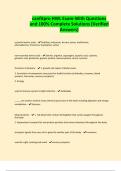canfitpro HWL Exam-With Questions
and 100% Complete Solutions (Verified
Answers)
essential amino acids - ✔histidine, isoleucine, leucine, lysine, methionine,
phenylalanine, threonine, tryptophan, valine
non-essential amino acids - ✔alanine, arginine, asparagine, aspartic acid, cysteine,
glutamic acid, glutamine, glycine, proline, selenocysteine, serine, tyrosine
functions of proteins - ✔1. growth and repair of body tissues
2. formation of components necessary for bodily function (antibodies, enzymes, blood
proteins, hormones, sensory receptors)
3. Energy
used in immune system to fight infection - ✔Antibodies
_____ are used to control many chemical processes of the body including digestion and energy
metabolism - ✔Enzymes
blood proteins - ✔1. red blood cells contain hemoglobin that carries oxygen throughout
the body
2. lipoproteins transport fat and protein particles that move cholesterol throughout the body
transport signals from one cell or gland to another part of the body - ✔hormones
used for sight, hearing and smell - ✔sensory receptors
,grams of protein equal to 4 calories - ✔1g protein
grams per kilogram of protein the average person requires a day - ✔0.8g
the two types of proteins - ✔complete and incomplete
proteins that contain all nine of the essential amino acids - ✔complete proteins
Proteins that are missing one or more of the essential amino acids; found in plant sources such
as nuts and legumes - ✔incomplete proteins
digestion of proteins - ✔1. in the mouth, initial mechanical breakdown begins
2. in the stomach's acidic juices, protein begins chemical digestion
3. in the small intestine's alkaline environment, chemical digestion continues with the aid
of additional enzymes
4. once broken down, amino acids are transported to the liver where they reassemble into
other proteins needed by the body
5. any undigested proteins are excreted
average % of total daily calories from proteins - ✔25-35%
the starches and sugars present in foods; classified into 2 groups (simple and complex),
comprising 4 subgroups (monosaccharides, disaccharides, oligosaccharides, polysaccharides) -
✔Carbohydrates
simple carbohydrates - ✔monosaccharides and disaccharides
Monosaccharides - ✔glucose, fructose, galactose
,any of a class of sugars whose molecules contain two monosaccharide residues -
✔Disaccharide
complex carbohydrates - ✔polysaccharides and oligosaccharides
2 saccharides; FOS (fructo-oligosaccharides) or GOS (galacto-oligosaccharides) -
✔Oligosaccharides
Carbohydrates that are made up of more than two monosaccharides; starch and glycogen -
✔Polysaccharides
where is glucose carried? For what? - ✔carried in the blood to the brain, heart,
kidney, muscles and other tissues; used for energy
a constant supply of _____ is needed for proper brain function - ✔glucose
2 qualities types of carbohydrate - ✔high quality and low quality
carbohydrate derived from fruit, veg, whole grains and other plant sources - ✔high
quality carbohydrate
carbohydrate found in processed food; these sources may contribute to weight gain - ✔low
quality carbohydrate
% of total daily calories from carbohydrate - ✔25-55%
grams of carbohydrate equal to 4 calories - ✔1g carbohydrate
, Where is glycogen stored? - ✔liver and muscles
Digestible carbohydrates are broken down or converted into ____ inside the body. - ✔Glucose
Storage form of glucose - ✔Glycogen
if carbohydrate intake exceeds the body's energy demands and storage space, it is converted to
___________ (fat) by the liver. - ✔Triglycerides
Tissue that stores fat - ✔adipose tissue
primary role of carbohydrate; secondary role of carbohydrate - ✔energy; fibre
two types of dietary fibre - ✔soluble and insoluble fibre
plant material that cannot be digested - ✔dietary fibre
Fibre that dissolves in water or is broken down by bacteria in the large intestine -
✔soluble fibre
Form of dietary fibre that binds water but does not dissolve; it adds bulk to the diet
and improves elimination. - ✔insoluble fibre
Benefits of eating fibre - ✔prevents heart disease; lower cholesterol; lowers risk of blood
clots; prevents constipation, haemorrhoids, colon and other cancers, lessens insulin required by
people with Type 1 Diabetes




